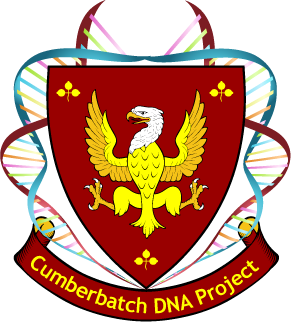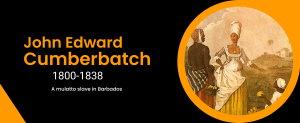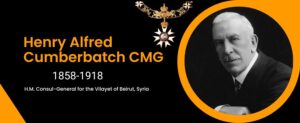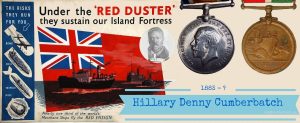Search

The Background to the Cumberbatch DNA Project
The DNA Project will help to discover where people with this surname came from and how they are related. DNA can help to plug the gaps caused by a lack of paper records and can offer new avenues for research and further discovery. For instance, are all of the spelling variations derived from a single common ancestor? The paper records have not been able to reveal this. However, without the traditional paper based research the DNA results would be impossible to understand.
This will be a complex DNA Project for a three primary reasons: 1) For the Cumberbatchs with English origins some individuals changed their surname from Comberbach or Cumberbatch to another. 2) Abraham Cumberbatch, the first Cumberbatch to arrive in Barbados, died with only daughters. His grandson changed his surname from Carleton to Cumberbatch in order to inherit. So the Y-DNA link to Bristol and Cheshire does not exist. 3) Finally, freed Barbados slaves took the surname from 1834 so whilst there are many called Cumberbatch I cannot tell how many may be genetically related.
Discover your Cumberbatch ancestry, your roots and your genetic cousins.
By Bob Cumberbatch www.cumberbatch.org
Order your Family Tree DNA kit today at the Family Tree DNA Project website: Cumberbatch DNA Project
Surname Spelling Differences: Are we all related?
Surnames often change in spelling when they move from area to area and from country to country. Paper records have not revealed if the major spellings of the original surname Comberbach are genetically related or not. The major groups of surnames are Comberbach mainly in England, Cumberbatchin Barbados, England, USA, Trinidad, Guyana, Latin America and others, Cumberpatch mainly Northampton, England, Cumberbirch, Cumberbeech, Cumberlege, Cumberledge and Cumberlidge. DNA test results will show if there is a genetic relationship between these surnames.
Family Tree Branch Relationships
Is there a relationship between the Nantwich and Haughton Comberbach families? From which branch did the Comberbachs of Bristol spring? Where do the Comberbachs of Harwarden fit? What about the other Comberbachs of Astbury, Cheshire?
DNA may be the only proof of a relationship between individuals, families and branches of the Cumberbatch family tree. Records rarely identify the natural father of an illegitimate child.
It will be very important to test at least 37 markers before a reliable relationship can be established.
Family History Research Challenges
Illegitimacy
In England every fifteenth child is illegitimate, in Belgium the fifteenth, in Sweden the fourteenth, in Prussia the thirteenth, in France the thirteenth, in Austria the ninth, in Bavaria the fourth; in Barbados the illegitimate children exceed those born in wedlock.
Source: Schomburgk 1845, “The History of Barbados” p.90
In Barbados marriages are relatively rare, so few children will be baptised with their natural father’s surname. It is often impossible to discover who the natural father was using paper records. Y-DNA will suggest which branch of the family the father will have come from. In this case, descendants may not be called Cumberbatch.
Equally, having the surname Cumberbatch does not imply that we are all related and share a single common ancestor. Some will, but most will not.
Illegitimacy is not limited to the Barbados Cumberbatchs. Laurence Sworton, aka Laurence Comberbach, the illegitimate son of Roger Comberbach moved to Leicestershire. Laurence Comberbach married Mary Barres in 1604. Are there any descendants of this branch?
Is there a relationship between the Nantwich and Haughton Comberbach families? From which branch did the Comberbachs of Bristol spring? Where do the Comberbachs of Harwarden fit? What about the other Comberbachs of Astbury, Cheshire?
DNA may be the only proof of a relationship between individuals, families and branches of the Cumberbatch family tree. Records rarely identify the natural father of an illegitimate child.
It will be very important to test at least 37 markers before a reliable relationship can be established.
Whose genes are they anyway? Surnames Change!
"Analysis showed that 27% of British African-Caribbean men have a Y chromosome (passed directly from father to son) that traces back to Europe not Africa. In sharp contrast only around 2% of British African-Caribbeans have mitochrondrial DNA that traces to Europe, rather than Africa, on their motherline (passed from mother to child)."
Marriages in Barbados are rare but that does not imply fathers were absent. Many children took their natural father’s surname in adult life unofficially. Often, paper records may survive for only two life events – a birth/baptism and a death/burial. The scenarios are:
- Born and Baptised as Cumberbatch but buried using another surname [I can find these]
- Born and Baptised as another surname but buried using Cumberbatch – either the natural father was Cumberbatch or they may have married a Cumberbatch, but marriages are rare.
After all Cumberbatch of Barbados was a surname adopted by the Grandson of Abraham Carleton in 1743. Charles Cumberbatch, son of Lawrence Trent Cumberbatch and Annie Cave, with ancestors from Barbados became Charles CAVE. Roger Comberbach, 1758-1814 of Cheshire, became Roger SWETENHAM; this branch stretches back to Roger Comberbach of Nantwich whose will was proved in 1602/3.
Nicknames
Many people were known by nick-names which may or may not relate to the individual’s actual forename. I had a great Aunt “Rene” who I tracked down to be Czarina, I would have had no chance of finding my father with his nick-name of “Smally”.
When the paper trail ends
-
Slavery
- Records of individual slaves were not kept
- Plantation records were private business records not public records like baptisms
- Slave registration covers the period from 1817 – 1834 and very few slaves have surnames in these registers
-
Missing registers and documents
- Barbados hurricanes, especially the big one of 1831 destroyed many church registers
- One of the key early registers for a church in Staffordshire does not exist
- Trinidad records – not available outside of Trinidad
- Guyana records – not available outside of Guyana
What is in it for you?
- Genetic Matches: Do you have any Genetic Cousins? Genetic matches are your Genetic Cousins who share the same direct paternal line for Y-DNA tests or maternal line for mtDNA tests. You will have access to your matches’ e-mail addresses and family history information that they have provided. You can begin exchanging information as soon as your results arrive.
- Ancestral Origins: Your paternal and/or maternal ancestral origins, listed by country, which provides clues to your own recent geographic and ethnic ancestry. The surname Cumberbatch originated in England and in Barbados. Migration has brought the surname name back to England and brought it to USA, Canada, Panama, Guyana and South America.
- Haplogroup: This is your place on the genetic tree of humankind. Do you have European or African Ancestry? Being of black ancestry is no guarantee of having African genetic roots.
- Migration Map & Frequency Map: Interactive maps detail the ancient migrations of your ancestors and the distribution of your haplogroup from more recent times.
- Y-DNA/mtDNA Certificate: This is a printable certificate that includes your name and your marker values.
- Updates As our database grows, you will receive notifications about new Genetic Cousin matches.
- Preferential Rates: Testing costs are reduced for Cumberbatch DNA Project members
Order your Family Tree DNA kit today at the Family Tree DNA Project website: Cumberbatch DNA Project
Then click on "Join Request" in the menu bar.
More Information on DNA Testing and what is possible
British people with Caribbean ancestors trace their roots using DNA: "Motherland: A Genetic Journey"; BBC documentary 2003
..
The remaining episodes Part 3 ; Part 4 ; Part 5 ; Part 6 ; Part 7 ; Part 8 ; Part 9 Final Part
A unique genetic study, undertaken for the BBC documentary Motherland: A Genetic Journey (BBC TWO, 14 February at 9.00pm), has finally provided the evidence to answer questions that historians and genealogists have been wrestling with for centuries.
For the first time since the enslavement of their African ancestors and the eradication of their ethnic identities, advances in DNA analysis have now made it possible for individuals to discover from which African region or population group their families originated.
In an historic first, a Bristol woman who took part in the study was even able to track down African relatives living on a tiny island off the coast of Cameroon.
The vast majority of the UK's African-Caribbean community are descended from the millions of Africans taken from their families and homes to work as slaves on the Caribbean sugar plantations.
The study, the most comprehensive attempt so far to investigate the specific roots of the descendants of slaves, took anonymous DNA samples via a buccal swab from 229 volunteers (109 men and 120 women). The only criterion for all volunteers was that they had four African-Caribbean grandparents.
As well as individual ancestral profiles, the Motherland study also quantifies, for the first time, one of the most sensitive genetic legacies of the transatlantic slave trade: the extent to which African slaves were made pregnant by European slave-owners.
Today, the study reveals more than one in four British African-Caribbeans have white male ancestry on their direct fatherline.
Analysis showed that 27% of British African-Caribbean men have a Y chromosome (passed directly from father to son) that traces back to Europe not Africa. In sharp contrast only around 2% of British African-Caribbeans have mitochrondrial DNA that traces to Europe, rather than Africa, on their motherline (passed from mother to child).
Dr Mark Jobling, from the University of Leicester, who analysed the Y chromosome, said of his findings: "[Slavery] was a power relationship between two populations and in that power relationship it was European men who where having sex with African women."
Dr Mark Jobling, (Department of Genetics, The University of Leicester); Dr Peter Forster (The McDonald Institute for Archaeological Research, Cambridge University); and Dr Mark Shriver (Department of Anthropological Genomics, Penn State University) respectively analysed the Y chromosome, mitochondrial DNA and autosomal DNA.
The autosomal study, investigating DNA inherited from all an individual's ancestors, demonstrated that on average more than one in seven (13%) ancestors of today's Black Britons of Caribbean descent would be of European origin.
As part of his analysis Dr Mark Shriver, of Penn State University, also examined the link between ancestry and pigmentation. He concludes that although African ancestry can be a rough guide to how light or dark a person is, appearances can be deceptive.
After in-depth research into his own origins, he discovered that although he looks like a white North American, he is, in fact, 25% African.
The feature-length documentary, Motherland: A Genetic Journey, is directed by award-winning film maker Archie Baron.
It follows the emotional journeys of three members of the group of genetic volunteers as they investigate their ancestry.
Mark, a music industry PR from South London travels to Niger, the second poorest country in the world, to meet the Kanuri people and reclaim a Kanuri name.
Beaula, a youth worker from Bristol, discovers that her ancestry lies in the tiny island of Bioko, Equatorial Guinea. Here she experiences an historic meeting with her blood relatives.
In contrast, Jacqueline, a Peterborough schoolteacher, explores her roots in Jamaica and discovers that a significant proportion of her ancestry is European.
"The Motherland project had two ambitious objectives", comments Baron, "firstly and monumentally, to see what genetics could finally reveal about the ancestry of British African Caribbeans. Secondly, to see whether genetics could reconnect individuals to contemporary population groups.
"The results of the three year project were more than we could have hoped for. Armed by science, people have for the first time reconnected themselves to their lost ancestry in ways that, 25 years ago, Alex Haley, author of Roots, could scarcely have imagined would ever be possible."
Source: 5 Feb 2003, BBC Documentary "Motherland" Long lost roots of Black Britons revealed by groundbreaking BBC TWO documentary; Press Release



